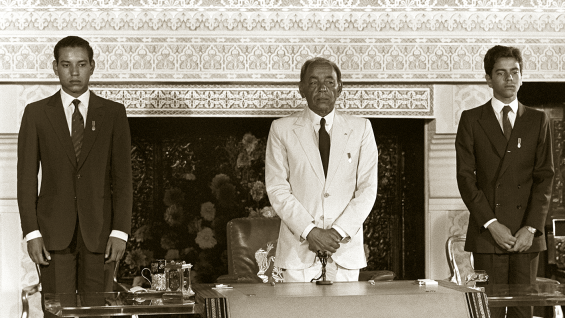In the early 1980s, a series of miscalculations by the Polisario Front led to setbacks in their fight against Morocco, according to a declassified CIA document dated April 1, 1983. The document reveals that the Polisario's tactics, based on the assumption of swift victories, backfired.
The separatist movement's tactics are based on the somewhat rash assumption that the Front would be able to win a series of spectacular military and political victories over Morocco, which would shake the Kingdom's confidence enough to make major concessions.
«In October 1981, the Polisario Front achieved a major victory against Moroccan military forces at Gueltat Zemmur in Western Sahara, inflicting on Morocco the biggest loss of men and material in a single engagement since the war began six years earlier. Shortly thereafter, the guerrillas won an equally important diplomatic victory by maneuvering to have the Saharan Democratic Arab Republic (SADR)seated at a ministerial meeting of the Organization of African Unity».
The US intelligence agency notes, however, that the Polisario's two «achievements» have turned into «Pyrrhic victories». Indeed, «the Front paid dearly for overestimating its abilities and miscalculating both Morocco's determination to prevail in Western Sahara and King Hassan’s formidable diplomatic talents».
A military failure
The CIA document goes on to say that after their victory at Gueltat Zemmur, «the guerrillas have watched King Hassan II turn defeat into a successful bid for greater military support from the United States and greater diplomatic support from Arab and African states».
US intelligence reports that Morocco has mobilized «the full force of its international relations and regional position to weaken the Polisario Front's momentum since the Gueltat Zemmour attack». As a result, Morocco has «received increased US military aid, enabling it to overcome the weak points in its defensive strategy».
Further on, the document explains that after this battle, the Polisario Front lost the initiative on the ground and «may not be able to mount a successful campaign, capable of weakening Morocco's resolve to defend its claim to the Sahara».
What's more, the Moroccan berm under construction since 1980, coupled with other improvements to Moroccan defenses, «will make small-unit [Polisario] attacks less effective than they once were», stresses the CIA. However, «such attacks still can exact Moroccan casualties and rattle morale» of separatist troops. The same source explains that Moroccan air strikes by Mirage F-1 aircraft, with their improved detection capability, are the main problems the Polisario was trying to solve.
In this respect, the CIA notes that «over the past two years the Polisario has accumulated an impressive modern inventory of heavy armaments; its holding of medium tanks, for example, equals about 70 percent of the Moroccan Army's inventory». Despite this, «a successful attack on one of the smaller sites along the Wall will have only a marginal military and political impact».
On the other hand, «an attack on one of the towns or major military encampments presents great hazards with regard to a safe withdrawal of slow-moving vehicles through narrow channels. It may, in any case, require more forces than the Polisario is willing to risk on one venture. There are few desirable targets outside the berm. Within Western Sahara, Dakhla remains beyond the protection of the main defensive perimeter».
As for attacks on garrisons in southern Morocco, according to the document, the movement would have to «gain permission from Algeria, which is unlikely to cooperate. In both instances, the Polisario would be taking on significant, perhaps even prohibitive risks. The Polisario is unlikely at this time to put together a battle plan that can do serious harm to the Moroccan military».
«The Polisario Front is almost powerless, due to the lack of good military options and the somewhat fickle nature of support from its main backers, Algeria and Libya, on which most of the Front's successes depend», the document explains, stressing that this situation serves Morocco's interests overall.
«A Polisario official later characterized the outcome of the battle of Guelta Zemmur as an incontestable military victory, but a political and strategic failure», the agency continues. It notes that King Hassan II had «masterfully created the impression that the Polisario used equipment of a sophistication that would have required foreign military advisors and the active involvement of Algeria and Mauritania, thereby enhancing King Hassan II's case for an increase in US military assistance to Morocco».
The failure of the Organization of African Unity
The CIA confirms that the Organization of African Unity (OAU) has suffered a major blow due to disagreements between Morocco and its supporters and the pro-Polisario camp led by Algeria and Libya. Many members are angry at how the Sahara issue had divided the organization and reduced its capacity to function. This division directly led to the cancellation of the 19th OAU annual summit in Tripoli. With this failure, many OAU members refused to allow the organization to be held hostage to another Arab conflict.
Also, one of the consequences of Polisario's participation in the OAU ministerial meeting was that «the committee charged with implementing the settlement process proposed by the organization has made no progress for over a year». To protest against the accession of the pseudo-state of Polisario as a new member of the OAU, «Morocco and 18 other African governments organized a boycott, which impeded the momentum towards an OAU-sponsored solution and disrupted the organization's meetings for the following months».
This division within the OAU, according to the document, «led to the 19th summit not being held in Tripoli». With this failure, «many OAU members refused to allow the organization to be held hostage to another Arab conflict».
Set up at the Tripoli meeting to find ways of reconvening the summit, the six-member communications group then met with various OAU members. At the end of September, «it concluded that the SADR question was jeopardizing the existence of the OAU», while stressing the importance of convening the summit towards the end of 1982. To this end, it was agreed that the Polisario should participate neither in the Council of Ministers meeting beforehand, nor in the summit itself.
After consultations with its supporters, the Front concluded that it «had no choice but to announce its temporary abstention from all resumed summit meetings». «The Communications Commission also recommended that the report of the Executive Committee for Western Sahara be included on the summit agenda, to revive the faltering peace process», adds the same source.
Polisario and terrorism
The CIA believed that extending the Moroccan berm would hinder the Polisario's access to their rear bases in Tindouf, significantly lengthening their communication lines and forcing them to cross northern Mauritania.
The agency further stated that with their ability to directly confront Morocco diminished, the Polisario might be more inclined to resort to terrorism to break Moroccan morale. The CIA also warned that U.S. intervention in the war could push the rebels to see destabilization operations within Morocco as a legitimate military tactic.
Despite not carrying out any attacks inside Morocco for fear of losing international support, the agency didn't rule out the possibility of the Polisario circumventing the berm. They suggested the separatists might launch attacks behind Moroccan lines from Algerian territory or infiltrate the «useful triangle» within the Sahara.
The CIA also confirmed Algerian awareness that the Polisario's effectiveness against the Moroccan army was hampered by the sand barrier, desertions, and a lack of discipline within their ranks.





 chargement...
chargement...













